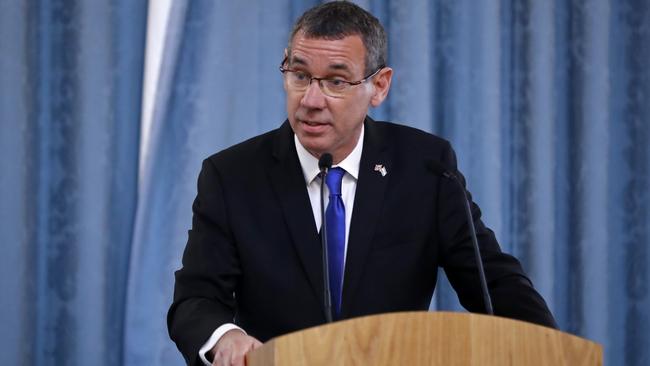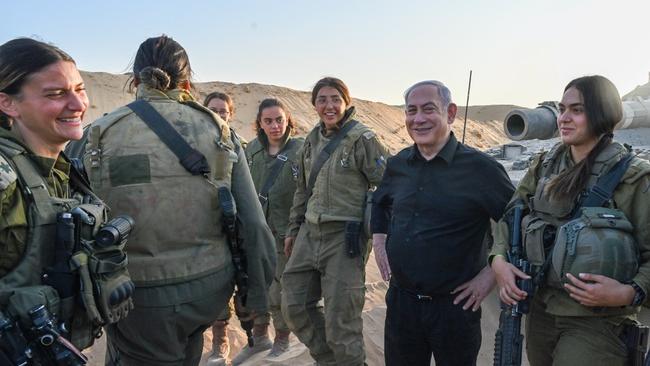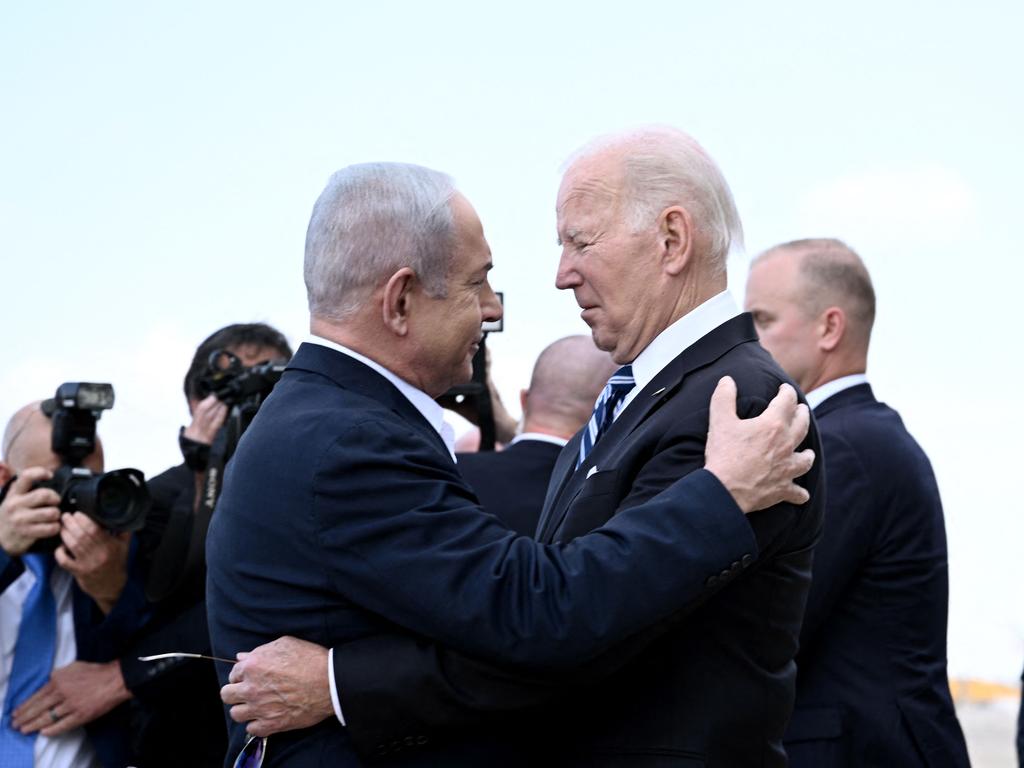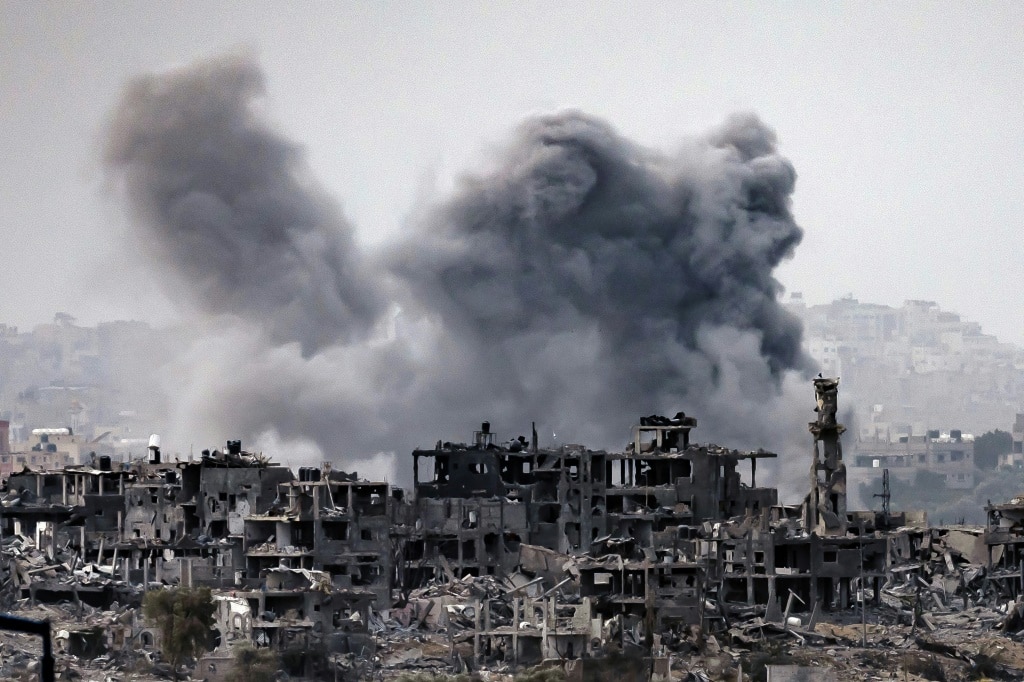Mark Regev: the man from Melbourne running Israel’s PR war
Australian-born Mark Regev has been a familiar sight on television during all manner of skirmishes with Hamas, who he says ‘gets a free ride’.

There are two wars being waged from the upper floors of Israel’s Ministry of Defence in downtown Tel Aviv. The first is an old-fashioned ground war, already on the verge of routing Hamas from Gaza barely six weeks after the incursion began.
The second is a PR war, one that cannot be settled with tanks and weapons. It’s a shadow campaign for hearts and minds taking place in lounge rooms across Britain, the US and even Australia, led in part by Mark Regev, a diplomat who’s spent more than 15 years serving as a bulwark for the Jewish state in times of calamity.
Born in Melbourne, he’s been a familiar sight on television during all manner of skirmishes and sorties with Hamas, whose formidable propaganda machine is often run unchecked, he says, by news organisations covering the conflicts. “Hamas gets a free ride because of their ability, through coercion, to control the message coming out of Gaza,” Mr Regev told The Australian.
Israeli society is awash with opinion, home to a cutthroat press corps keen to tear strips off its political leaders. Commentators let loose on nightly talk-show panels and the newspapers are brimming with scathing editorials.
It’s a free society, Mr Regev says, and there’s a fundamental misunderstanding of what life is like, by comparison, under the Islamist regime in Gaza, a place of civil dysfunction where speaking to power can be punished severely.
Not long after being elected in 2007, Hamas rounded up its political opponents from the Fatah movement for summary execution, either gunning them down or tying their hands behind their backs and tossing them off tall buildings. There are consequences, Mr Regev says, from speaking too freely in Gaza, the threat of harm being why only one story ever emerges from a society always on message.
“Have you seen a single picture of a dead Hamas fighter? One? No,” he says. “Hamas through its brutal autocratic regime can control the sort of pictures coming out of Gaza.
“When someone in Melbourne hears a hospital director talking from Gaza, they don’t know it’s a Hamas-appointed hospital director. When they say we’re from the Palestinian Red Crescent, people in Adelaide think ‘that’s like our Red Cross’, but no, it’s not. Palestinian Red Crescent is not independent.”
What Mr Regev would like to see during such interviews is a type of disclaimer that makes the Hamas affiliation clearer to audiences, although mainstream news organisations have already shown a greater modicum of care with how they’re using information coming out of Gaza.
A turning point was the explosion at the Al-Ahli hospital during the opening week of the war. Hamas officials, knowing one of their misfired rockets caused the blast, seized the opportunity to blame Israel for the strike. It was an allegation that instantly created international headlines, many of which were later walked back once evidence emerged that Israel was not responsible. The reported death toll of nearly 500 people was also found to have been exaggerated, as were details of the strike itself; Hamas had said the hospital suffered a direct hit when in fact the rocket landed in a car park.
It’s why some reputable news organisations refer to the “Hamas-run Gaza Health Ministry” whenever civilian casualty figures are being quoted, a caveat that seems to acknowledge suspicions of reliability, not least because Hamas never distinguishes between civilians and its own militants.
“That’s very important,” Mr Regev said. “The minute you say it’s the Hamas-controlled Ministry of Health, which is true, then people will raise a question mark about it – that if it’s Hamas controlled maybe it isn’t accurate.”

Call it a minor coup but it’s one that’s been long sought by Mr Regev and his team, their frustrations built over years of fighting the information wars with Hamas. He was there for Operation Cast Lead in 2009 and Pillar of Defence in 2012, then Protective Edge in 2014. There were rounds and clashes while he worked for prime minister Ehud Olmert in 2006, then Benjamin Netanyahu following the 2009 elections, staying put until 2016 when he was named Israel’s ambassador to the UK, a role held until 2020.
On the morning of October 7, he was enjoying time away from public life as the head of a think-tank specialising in foreign relations and diplomacy. Israel’s darkest day had just started in the country’s south when the phone rang with a call from the Prime Minister’s office. It wasn’t Mr Netanyahu, but someone speaking on his behalf was asking Mr Regev to return to his old job as Israel’s loudspeaker to the foreign media – an offer he could hardly refuse in a time of war.
Mr Regev has no compunction admitting it’s the US audience he’s mostly speaking to with his megaphone, and to a lesser extent the European and British media. It’s why all of Mr Netanyahu’s foreign interviews to date have been held with news organisations anchored in the US; it’s because Israel wants to strengthen American public opinion as much as possible behind President Joe Biden’s support for the Jewish state.
“The Europeans will only be as strong as the Americans – they’ll never be stronger,” Mr Regev said.
“We have no better friend in the world. That’s why America is the priority.”
And Australia? Anthony Albanese held a phone call with Mr Netanyahu but hasn’t visited Israel, nor has Foreign Minister Penny Wong. Her recent calls for a ceasefire with Hamas surprised some in the Israeli establishment and were criticised by Opposition Leader Peter Dutton.
The common complaint about the Albanese government is that support for Israel exists, but it comes with conditions.
Mr Regev declined to discuss Australia’s positioning but, like many, he said a ceasefire now would give Hamas the time it needs to rearm and rebuild itself for further attacks – and such attacks have already been assured by Hamas official Ghazi Hamad, who told Lebanese TV of “a second, a third, a fourth” attempt at replicating October 7 until Israel is “annihilated”.
Interviews like those are only helpful to Israel’s cause, Mr Regev said. It pleases him to see Hamas officials speak their mind on television, because “when they tell you what they think, most people are appalled”.
Asked whether those calling for a ceasefire were misguided, or even embarrassing themselves, Mr Regev laughed. “They’re wrong,” he said.








To join the conversation, please log in. Don't have an account? Register
Join the conversation, you are commenting as Logout